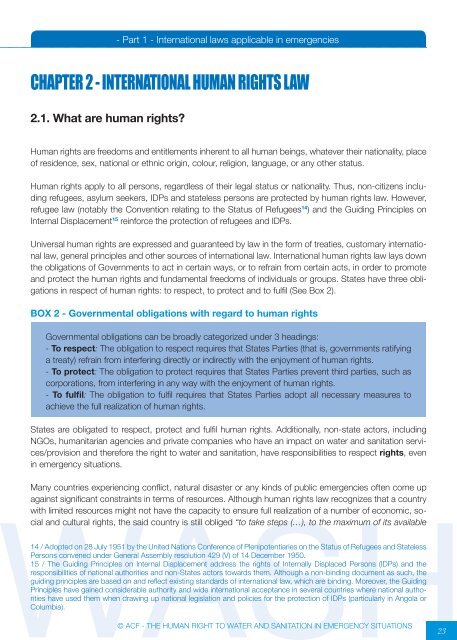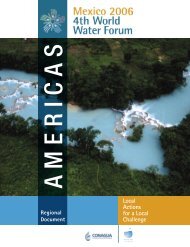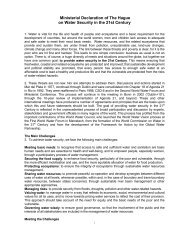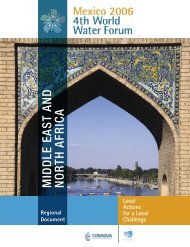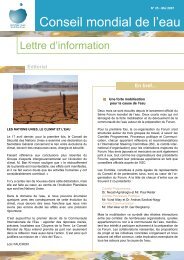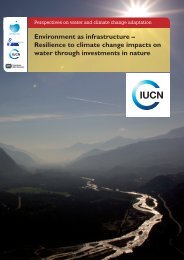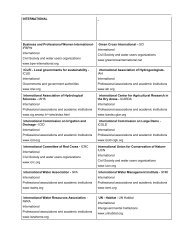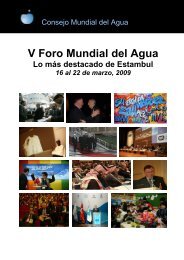the human right to water and sanitation in emergency situations
the human right to water and sanitation in emergency situations
the human right to water and sanitation in emergency situations
Create successful ePaper yourself
Turn your PDF publications into a flip-book with our unique Google optimized e-Paper software.
CHApTER 2 - INTERNATIONAl HUMAN RIGHTS lAW<br />
2.1. What are <strong>human</strong> <strong>right</strong>s?<br />
- Part 1 - International laws applicable <strong>in</strong> emergencies<br />
Human <strong>right</strong>s are freedoms <strong>and</strong> entitlements <strong>in</strong>herent <strong>to</strong> all <strong>human</strong> be<strong>in</strong>gs, whatever <strong>the</strong>ir nationality, place<br />
of residence, sex, national or ethnic orig<strong>in</strong>, colour, religion, language, or any o<strong>the</strong>r status.<br />
Human <strong>right</strong>s apply <strong>to</strong> all persons, regardless of <strong>the</strong>ir legal status or nationality. Thus, non-citizens <strong>in</strong>clud<strong>in</strong>g<br />
refugees, asylum seekers, IDPs <strong>and</strong> stateless persons are protected by <strong>human</strong> <strong>right</strong>s law. However,<br />
refugee law (notably <strong>the</strong> Convention relat<strong>in</strong>g <strong>to</strong> <strong>the</strong> Status of Refugees 14 ) <strong>and</strong> <strong>the</strong> Guid<strong>in</strong>g Pr<strong>in</strong>ciples on<br />
Internal Displacement 15 re<strong>in</strong>force <strong>the</strong> protection of refugees <strong>and</strong> IDPs.<br />
Universal <strong>human</strong> <strong>right</strong>s are expressed <strong>and</strong> guaranteed by law <strong>in</strong> <strong>the</strong> form of treaties, cus<strong>to</strong>mary <strong>in</strong>ternational<br />
law, general pr<strong>in</strong>ciples <strong>and</strong> o<strong>the</strong>r sources of <strong>in</strong>ternational law. International <strong>human</strong> <strong>right</strong>s law lays down<br />
<strong>the</strong> obligations of Governments <strong>to</strong> act <strong>in</strong> certa<strong>in</strong> ways, or <strong>to</strong> refra<strong>in</strong> from certa<strong>in</strong> acts, <strong>in</strong> order <strong>to</strong> promote<br />
<strong>and</strong> protect <strong>the</strong> <strong>human</strong> <strong>right</strong>s <strong>and</strong> fundamental freedoms of <strong>in</strong>dividuals or groups. States have three obligations<br />
<strong>in</strong> respect of <strong>human</strong> <strong>right</strong>s: <strong>to</strong> respect, <strong>to</strong> protect <strong>and</strong> <strong>to</strong> fulfil (See Box 2).<br />
BoX 2 - Governmental obligations with regard <strong>to</strong> <strong>human</strong> <strong>right</strong>s<br />
Governmental obligations can be broadly categorized under 3 head<strong>in</strong>gs:<br />
- To respect: The obligation <strong>to</strong> respect requires that States Parties (that is, governments ratify<strong>in</strong>g<br />
a treaty) refra<strong>in</strong> from <strong>in</strong>terfer<strong>in</strong>g directly or <strong>in</strong>directly with <strong>the</strong> enjoyment of <strong>human</strong> <strong>right</strong>s.<br />
- To protect: The obligation <strong>to</strong> protect requires that States Parties prevent third parties, such as<br />
corporations, from <strong>in</strong>terfer<strong>in</strong>g <strong>in</strong> any way with <strong>the</strong> enjoyment of <strong>human</strong> <strong>right</strong>s.<br />
- To fulfil: The obligation <strong>to</strong> fulfil requires that States Parties adopt all necessary measures <strong>to</strong><br />
achieve <strong>the</strong> full realization of <strong>human</strong> <strong>right</strong>s.<br />
States are obligated <strong>to</strong> respect, protect <strong>and</strong> fulfil <strong>human</strong> <strong>right</strong>s. Additionally, non-state ac<strong>to</strong>rs, <strong>in</strong>clud<strong>in</strong>g<br />
NGOs, <strong>human</strong>itarian agencies <strong>and</strong> private companies who have an impact on <strong>water</strong> <strong>and</strong> <strong>sanitation</strong> services/provision<br />
<strong>and</strong> <strong>the</strong>refore <strong>the</strong> <strong>right</strong> <strong>to</strong> <strong>water</strong> <strong>and</strong> <strong>sanitation</strong>, have responsibilities <strong>to</strong> respect <strong>right</strong>s, even<br />
<strong>in</strong> <strong>emergency</strong> <strong>situations</strong>.<br />
Many countries experienc<strong>in</strong>g conflict, natural disaster or any k<strong>in</strong>ds of public emergencies often come up<br />
aga<strong>in</strong>st significant constra<strong>in</strong>ts <strong>in</strong> terms of resources. Although <strong>human</strong> <strong>right</strong>s law recognizes that a country<br />
with limited resources might not have <strong>the</strong> capacity <strong>to</strong> ensure full realization of a number of economic, social<br />
<strong>and</strong> cultural <strong>right</strong>s, <strong>the</strong> said country is still obliged “<strong>to</strong> take steps (…), <strong>to</strong> <strong>the</strong> maximum of its available<br />
14 / Adopted on 28 July 1951 by <strong>the</strong> United Nations Conference of Plenipotentiaries on <strong>the</strong> Status of Refugees <strong>and</strong> Stateless<br />
Persons convened under General Assembly resolution 429 (V) of 14 December 1950.<br />
15 / The Guid<strong>in</strong>g Pr<strong>in</strong>ciples on Internal Displacement address <strong>the</strong> <strong>right</strong>s of Internally Displaced Persons (IDPs) <strong>and</strong> <strong>the</strong><br />
responsibilities of national authorities <strong>and</strong> non-States ac<strong>to</strong>rs <strong>to</strong>wards <strong>the</strong>m. Although a non-b<strong>in</strong>d<strong>in</strong>g document as such, <strong>the</strong><br />
guid<strong>in</strong>g pr<strong>in</strong>ciples are based on <strong>and</strong> reflect exist<strong>in</strong>g st<strong>and</strong>ards of <strong>in</strong>ternational law, which are b<strong>in</strong>d<strong>in</strong>g. Moreover, <strong>the</strong> Guid<strong>in</strong>g<br />
Pr<strong>in</strong>ciples have ga<strong>in</strong>ed considerable authority <strong>and</strong> wide <strong>in</strong>ternational acceptance <strong>in</strong> several countries where national authorities<br />
have used <strong>the</strong>m when draw<strong>in</strong>g up national legislation <strong>and</strong> policies for <strong>the</strong> protection of IDPs (particularly <strong>in</strong> Angola or<br />
Columbia).<br />
© ACF - THE HUMAN RIGHT TO WATER AND SANITATION IN EMERGENCY SITUATIONS<br />
23


